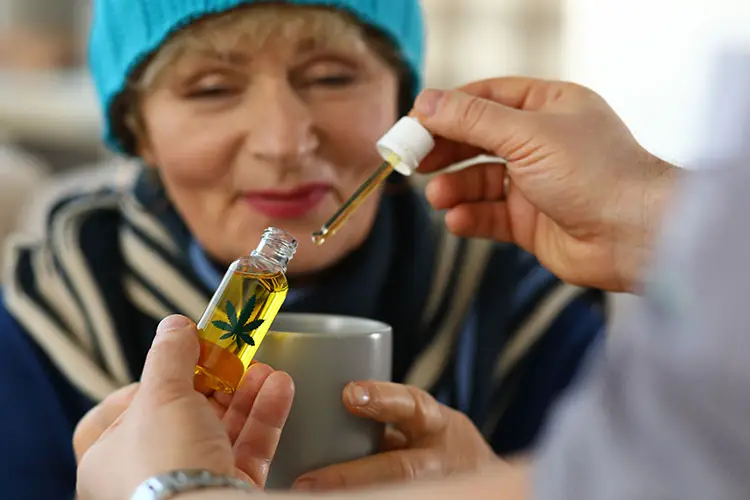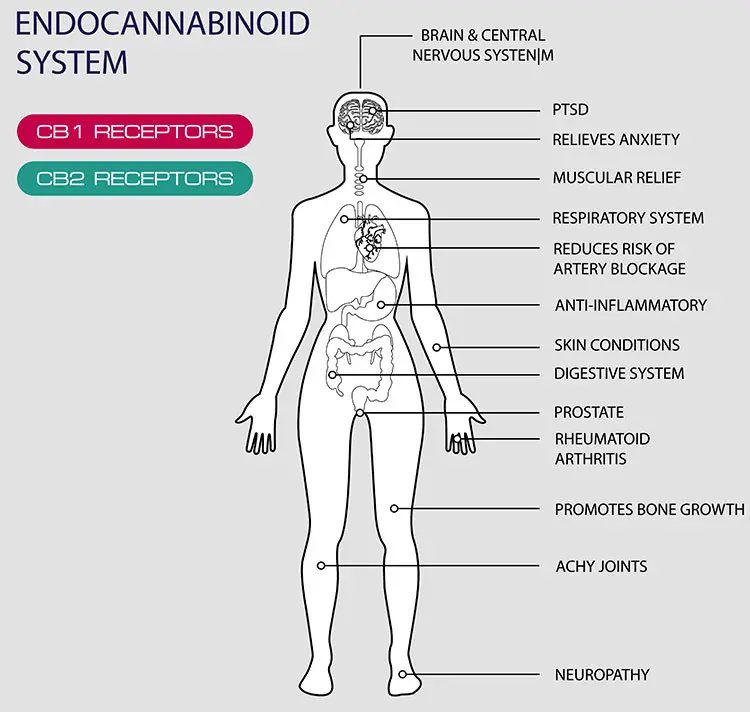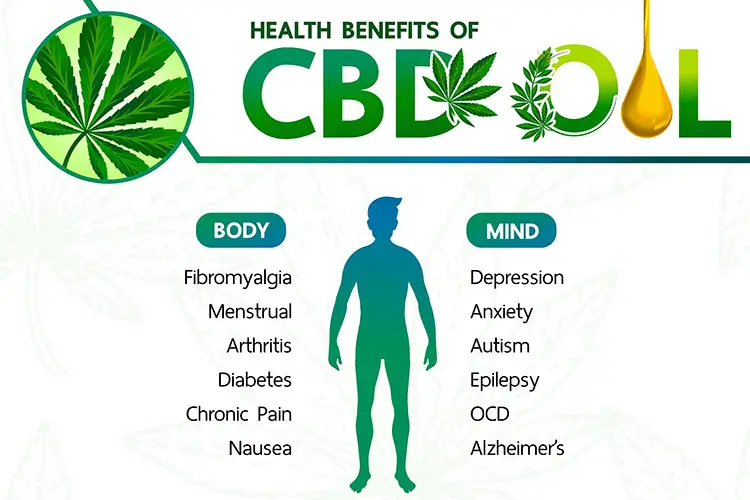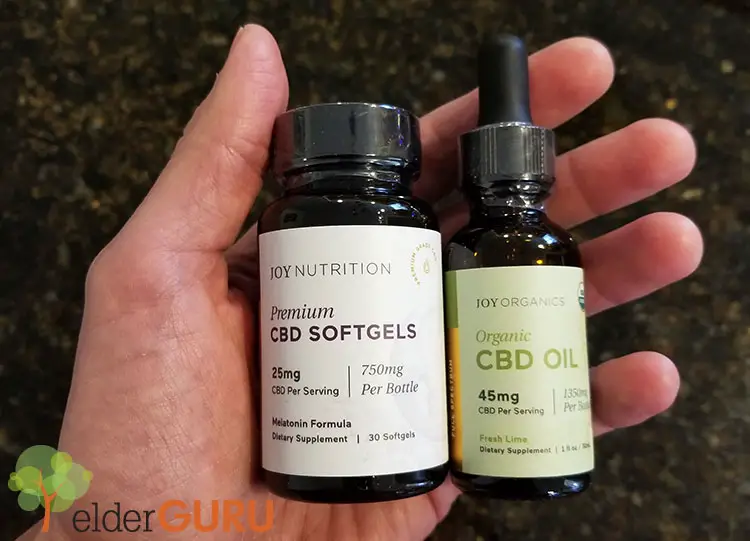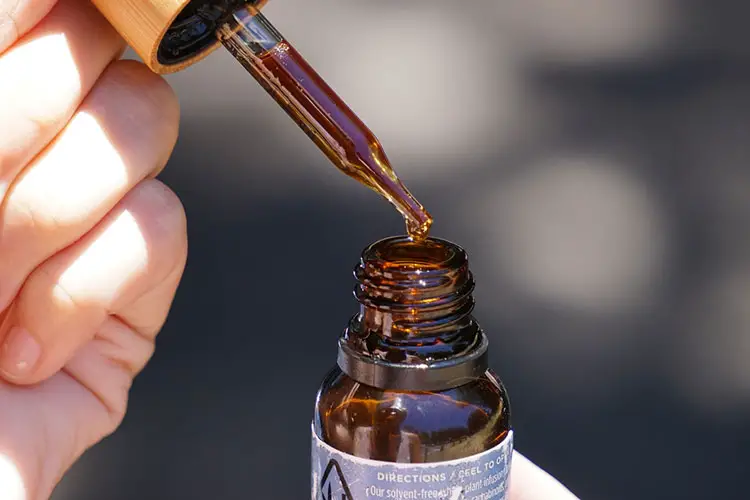CBD is becoming more widely used by the general public as social acceptance and understanding of its medicinal benefits become better known. One population that may be left out of this trend are older adults, but they too can benefit. Let’s look into the benefits of CBD for seniors.
68% of all adults aged 65 or more live with two or more chronic conditions, while 80% live with one. Though some conditions may cause mild discomfort only, others are quite debilitating and can significantly impact your life quality.
Nowadays, there are plenty of therapeutic options to manage these conditions but not everyone responds to these treatments. On top of that, some medications can bring about undesired side effects.
CBD can help you manage or prevent several ailments and symptoms. And given that it is non-intoxicating, non-addictive, and rarely leads to negative side effects, a lot of people are now seeing it as a life-changing option – CBD might just be the answer you’ve been searching for.
In this article, we’ll cover everything you need to know about CBD and seniors. First, we’ll let you know what CBD is and how it interacts with your body, as well as whether or not it is safe for seniors.
Then, we’ll give you eleven backed-by-research health benefits of CBD for seniors. And, finally, we’ll provide you with all the practical tips you need to choose CBD products that help and suit you and teach you how to find out your ideal dosage.
What Is CBD?
Cannabidiol, or CBD, is one of the most abounding cannabinoids found in the stalks, stems, leaves, and flowers of cannabis plants.
This compound is non-addictive and non-intoxicating, meaning that CBD can’t get you ‘high.’ The infamous compound responsible for the psychotropic effects of cannabis is tetrahydrocannabinol (THC).
How Does CBD Interact with the Human Body?
The mechanisms behind how CBD interacts with the human body are not fully known yet. However, what we do know is that CBD binds to the many receptors of the endocannabinoid system (ECS).
The ECS’s goal is to maintain homeostasis – or body balance. It consists of a complex network of neurotransmitters and receptors spread throughout the body. Some places where you can find endocannabinoid receptors include:
- The central and peripheral nervous system, including in the brain and bone marrow
- The immune system
- The vascular system
- The respiratory system, including in the lungs
- The digestive system, including in the pancreas, liver, and gastrointestinal tract
- The reproductive organs
- The muscles
- The skin
When CBD binds to these receptors, it optimizes how the ECS works, helping your body return to balance faster.
The most interesting thing about the mechanism that makes CBD superior to so many other therapeutic options is that it’ll only target what is, in fact, out of balance in each person’s body.
This way, CBD has a major influence in:
- Decreasing anxiety, nausea, pain, excessive inflammation, blood pressure, seizures, and spasms;
- Improving cognitive function;
- Stabilizing the appetite and mood;
- Regulating processes like immune response, metabolism, memory, sleep, and communication between cells, among others.
Is CBD Safe for Seniors?
While some doctors believe CBD is safe for seniors, others claim that the research available so far is insufficient but still classify CBD as “possibly safe.” There are no documented CBD overdoses.
The most common side effects of CBD reported by older adults are somnolence, decreased appetite, diarrhea, and increased liver function. Other possible side effects include lightheadedness, dry mouth, and orthostatic hypotension.
Researchers highlighted that undesired side effects appear to have a strong relation to dosage. To attain the desired effects, you must know your perfect dose and regimen.
And remember that starting with a high dose might not be safe. We’ll teach you how to figure out your perfect dosage at the end of the article.
If you’re taking other medication, you should set an appointment with your health provider before you start taking CBD.
Additionally, you shouldn’t stop your current medication abruptly to replace it with CBD. It should be a progressive transition.
Health Benefits of CBD for Seniors
CBD is still a relatively new therapy option and researchers are constantly finding new benefits of this molecule. CBD is mostly used to relieve symptoms like pain, anxiety, and insomnia.
This compound can be beneficial to people of all ages, including seniors. Let’s take a look at the potential advantages of CBD for seniors.
1. Pain Relief
Chronic pain is a very common symptom among seniors. It has a plethora of possible causes, including diabetes, surgery, musculoskeletal disorders (like arthritis), and heart or renal disease.
Studies have shown CBD’s efficacy at managing pain, especially when caused by osteoarthritis, rheumatoid arthritis, cancer, fibromyalgia, and multiple sclerosis.
Studies have also shown that using CBD consistently can drastically relieve pain and improve mobility and life quality. It is also a great alternative to some prescribed or over-the-counter medications that have notoriously negative side effects.
One study showed that taking CBD orally reduced chronic inflammatory and neuropathic pain, while another suggested that a daily oral dose of CBD decreased rheumatoid arthritis pain and improved mobility and sleep quality.
Moreover, when you use CBD consistently for a long time, the way that the brain perceives and responds to pain positively changes.
2. Anxiety Management
Usually, seniors suffering from anxiety already carry it from a younger age. However, it can intensify when you experience abrupt life changes, like retirement, the death of a loved one, or new health concerts.
CBD has antidepressant and anxiolytic-like abilities that can reduce anxiety – especially in social situations.
A study conducted on over 70 adults suffering from anxiety showed that after one month of using CBD, anxiety decreased in almost 80% of them.
3. Improved Sleep
A lot of seniors struggle to get a good night of sleep because as we age the neurons that regulate sleep start to die.
The greatest problem is that seniors start to go through less time of deep and REM sleep, which are necessary to restore our physical and cognitive functions. Additionally, sleep deprivation increases the odds of developing dementia and Alzheimer’s and weakens the immune system.
CBD targets some of the causes of poor sleep quality, like pain or anxiety. But it also provides a deep relaxation that can help you fall asleep faster, stabilizes your sleep pattern, makes you feel alert and fresh during the day, and reduces sleep apnea.
4. Boosted Immune System
The immune system is pivotal to keep us healthy. It eliminates malign particles, like viruses and bacteria, and plays a role in cancer prevention.
The endocannabinoid system regulates the immune system and CBD can act as both an immunosuppressant or an immunostimulant – meaning that it can normalize an underperforming or overperforming immune system.
So, depending on the problem you’re facing, CBD can boost your system’s ability to fight invaders or help those with autoimmune diseases, like psoriasis, Crohn’s disease, arthritis, Parkinson’s disease, or lupus.
5. Bone and Joint Health – Is CBD Good for Arthritis?
According to the Arthritis Foundation, there are plenty of people reporting “pain relief, sleep improvement, and/or anxiety reduction” when taking CBD.
However, they also point out that there are only animal studies suggesting the effectiveness of CBD as an anti-inflammatory and pain-killer.
Still, they highlighted that there’s plenty of anecdotal evidence in CBD’s favor. Many people report sleeping better and a decrease in anxiety and pain.
In theory, CBD is beneficial for people suffering from arthritis due to its anti-inflammatory and painkiller properties but it is not a substitute for your prescription medicine and you should always talk with your health provider before starting to use it.
6. Decreased Likelihood of Alzheimer’s, Type 2 Diabetes, Heart Disease, Cancer, and Autoimmune Diseases
By reducing excessive inflammation in your body, CBD can be a great therapeutic for diseases like irritable bowel syndrome or arthritis.
But CBD can also prevent a myriad of health complications that are a consequence of inflammation. Those include type 2 diabetes, heart or autoimmune diseases, cancer, and Alzheimer’s.
In the specific case of Alzheimer’s, CBD can have both a preventive and reversive effect. One study suggested it can act as a neuroprotective agent by reducing neuroinflammation. While another claimed CBD can reverse the cognitive decline caused by Alzheimer’s.
7. Improved Life-quality for Parkinson’s Disease Patients
Although research on the effectiveness of CBD for Parkinson’s disease is still at an early stage, one study suggests that patients can enjoy a higher quality of life with a daily regimen of CBD.
Note that this study was carried out in people who didn’t suffer from other psychiatric conditions.
8. Decreased Spasticity for Multiple Sclerosis (MS) Patients
A quarter of people diagnosed with MS live until they’re 65 or older. However, they experience a much-reduced quality of life.
A study proved CBD’s ability to significantly decrease spasticity in MS patients who were given a daily oral dose of the compound for a month.
9. Management of Cancer-related Symptoms
It’s common for cancer patients to live with anxiety, depression, pain, and sleep problems. Additionally, 60% of new cancer diagnoses and 70% of cancer deaths happen among seniors.
Firstly, CBD can replace the highly addictive opioid painkillers that are often prescribed or be the go-to painkiller for those that don’t respond to traditional therapies.
Secondly, CBD can alleviate other chemotherapy-related symptoms, like nausea and vomiting. These symptoms are so severe, at times, that they cause patients to give up the treatment altogether, drastically lowering their chances of survival.
10. Improved Cardiovascular Health
There’s proof of CBD’s ability to improve heart health in healthy people. Moreover, by lowering cholesterol levels, CBD can decrease the risk of cardiovascular disease. But it can also help those suffering from diabetes and cardiovascular diseases already.
11. Aid in Fighting Addiction
Seniors are at an increased risk of addiction, mainly due to prescription painkillers they’re advised to take. CBD, on the other hand, is non-addictive and rarely builds tolerance. Studies have proved its ability to treat both heroin and cigarette addiction.
What CBD Products Should Seniors Use?
There are plenty of ways to incorporate CBD into your daily life. There are also plenty of different manufacturers who sell quality CBD for seniors. Following are some companies that we recommend.
| CBD Company | About the Company |
|---|---|
| Avid Hemp | Avid Hemp has business relationships with hemp-farming associations in Florida and Colorado. They look for sustainable farming with strict quality-control. |
| Pur CBD | Based in Miami, Florida, Pur CBD’s mission is to “be on the frontlines of natural health care, catering to those in search of new and improved ways to achieve an overall well-being and balanced lifestyle.” |
| Happy Garden CBD | Happy Garden began business in 2008 with leading scientists from Spain. They offer premium strains that contain minimal quantities of THC. |
| Joy Organics | Joy Organics is USDA certified organic full and broad spectrum CBD. They offer only premium CBD. |
| Prosper Wellness | Prosper Wellness is a Colorado-based company. The founder, Kriss Bergethon, suffered from a lot of pain and turned from prescription drugs, to which he knew he was getting addicted, to CBD alternatives. |
Choosing between the different options depends both on your preference and the problem you’re targeting. The most popular ones include CBD oil and capsules, edibles and drinkables, tinctures and sprays, concentrates, e-liquids, and different forms of topical CBD. Let’s look at each type a bit more closely.
CBD Oil and CBD Capsules
CBD oil is the most versatile option. You can ingest it alone or incorporate it into food or beverages. CBD capsules are an easy alternative if you don’t like the oil’s flavor or if you have a hard time dosing with the dropper.
CBD Edibles and Drinkables
The advantage of making your own edibles or drinkables over buying pre-made ones is that you can control the amount of CBD you’re taking more accurately. Pre-made edibles and drinkables are unreliable at times.
CBD Tinctures and Sprays
Tinctures and sprays are applied orally. You should put a tincture under your tongue for at least a minute before swallowing. With sprays, you simply spray them into your mouth.
Tinctures and sprays have greater bioavailability than oils due to their composition, so you’ll feel the effects significantly faster.
CBD Concentrates
CBD concentrates are meant to be added to food or drinks. Its greatest advantage is that you’ll know exactly how much CBD you’re taking.
All these options take a relatively long time to produce effects, but they also last longer. If you’re serious about starting a daily CBD regimen, you should pick one of the above routes and complement it with topicals and/or vaping for specific purposes.
CBD E-liquid for Vaping
Vaping offers the fastest results. Its effects spread through your whole body, just like the previous options but you can feel them right away – it’s perfect for emergency relief. Just beware that vaping can be quite harsh on your lungs and cause other health issues.
CBD Topicals, Like Balms, Lotions, and Salves
Finally, topicals are applied directly over the affected area – this is ideal for those dealing with skin conditions. However, if you have joint or muscular problems, transdermal products, like patches, are better since they can penetrate deeper than regular topicals.
Other Considerations When Choosing CBD Products
All these different CBD products can come in one of three forms:
- Isolate CBD: contains only CBD at a high purity level.
- Broad-spectrum CBD: contains all compounds in the cannabis plant, including other cannabinoids and terpenes, except THC.
- Full-spectrum CBD: contains all compounds in the cannabis plant, including THC. Depending on the concentration of THC, a full-spectrum CBD product may get you high.
The greatest advantage of isolate CBD is that you don’t risk getting an allergic reaction to any other component in the oil. Moreover, when using isolate or broad-spectrum CBD, you can be sure you’ll pass a drug test if you’re ever submitted to one.
However, with broad-spectrum and full-spectrum CBD you can benefit from the entourage effect.
The entourage effect is a scientific theory that defends that all the cannabinoids, terpenes, and flavonoids present in cannabis can work together synergistically and produce better and stronger effects than CBD on its own.
Dr. Danial Schecter, the co-founder of a network of cannabis-based medicine clinics and Director of Global Medical Services at Canopy Growth Corporate, defends this theory.
In an interview with Forbes, he recommended a combination of CBD and THC (in doses that can’t get you high) for those who need help with sleep, pain, appetite stimulation, nausea, and muscle spasms – and especially, for seniors.
How Much CBD Should Seniors Take?
Dosage-wise, while some people take as low as 5 to 10 mg per day, others are using as much as 1500 mg daily with no negative side effects. The most common doses range between 40 and 100 mg of CBD per day.
Notwithstanding, each person’s endocannabinoid system is different. You should always start with a low dose and progressively increase it until you find your perfect dosage.
Documenting how you feel while you experiment with different administration methods and doses can be helpful to figure out your ideal CBD regimen.
When targeting anxiety and pain, the most common dose ranges between 40 and 100 mg – again, start low and find out what works best for you.
Usually, the recommended starting dose is 5 mg. However, since seniors are often on other medication, they should start with 2.5 mg only and work their way up with 2.5 mg increments.
Know that CBD’s results arise faster for physical ailments than psychological ones – such as anxiety and depression. So, depending on what you’re targeting, those increments can be done every two days or weekly.
The Bottom-line – Is CBD Good for Seniors?
CBD can treat, manage, and/or prevent several different symptoms and diseases, including Alzheimer’s, Parkinson’s, type 2 diabetes, autoimmune diseases, like arthritis, sleep disturbances, anxiety, and chronic pain.
When asked “How does CBD make you feel?” Emily Heitman, co-founder, COO, and CMO of Leef Organics, said that:
CBD is used and repurposed by your body in the way you need it most, so the feeling by each individual tends to be a bit different. However, I think everyone feels relief and balance from the daily use of CBD.
Whether you don’t respond to traditional therapies, are looking for complementary treatment, or want to replace harmful prescribed medications, CBD is a great alternative.
Just remember to start with a low dose, building up from there, and always talk with your health provider before you start taking CBD – especially if you’re concurrently taking other medications.
On a final note, we’d like to highlight that CBD can be used as both a preventive and therapeutic measure. As long you do some proper research before starting your CBD journey, you’ll surely benefit from it in some way.
Sources Cited
- CFAH: What Is CBD Oil? What Does Cannabidiol Stand For?
- PubMed: Addictive Behaviors – Cannabidiol reduces cigarette consumption in tobacco smokers: preliminary findings
- Journal of Young Investigators: The Endocannabinoid System, Our Universal Regulator
- HealthCanal: 22 Benefits Of CBD Oil: Based On Academic Research
- Forbes: CBD Safety For Seniors
- US Pharmacist: Cannabidiol Use in Older Adults
- NCBI: BMJ – Management of chronic pain in older adults
- NCBI: Therapeutics and Clinical Risk Management – Cannabinoids in the management of difficult to treat pain
- PubMed: European Journal of Pharmacology – The non-psychoactive cannabis constituent cannabidiol is an orally effective therapeutic agent in rat chronic inflammatory and neuropathic pain
- PubMed: Rheumatology – Preliminary assessment of the efficacy, tolerability and safety of a cannabis-based medicine (Sativex) in the treatment of pain caused by rheumatoid arthritis
- NCBI: Frontiers in Pharmacology – Cannabidiol Is a Potential Therapeutic for the Affective-Motivational Dimension of Incision Pain in Rats
- PubMed: PLoS One – Distinct neurobehavioural effects of cannabidiol in transmembrane domain neuregulin 1 mutant mice
- NCBI: The Permanente Journal – Cannabidiol in Anxiety and Sleep: A Large Case Series
- PubMed: PLoS One – Endocannabinoid Signaling Regulates Sleep Stability
- PubMed: Current Psychiatry Reports – Cannabis, Cannabinoids, and Sleep: a Review of the Literature
- CBD News Today: What is CBD Oil Good for?
- Arthritis Foundation: CBD for Arthritis Pain: What You Should Know
- NCBI: Frontiers in Pharmacology – In vivo Evidence for Therapeutic Properties of Cannabidiol (CBD) for Alzheimer’s Disease
- PubMed: Journal of Alzheimer’s Disease – Long-term cannabidiol treatment prevents the development of social recognition memory deficits in Alzheimer’s disease transgenic mice
- PubMed: Journal of Psychopharmacology – Effects of cannabidiol in the treatment of patients with Parkinson’s disease: an exploratory double-blind trial
- PubMed: Neural Plasticity – Sativex in the management of multiple sclerosis-related spasticity: role of the corticospinal modulation
- NCBI: Transactions of the American Clinical and Climatological Association – Cancer in the Elderly
- PubMed: Journal of Pain and Symptom Management – Multicenter, double-blind, randomized, placebo-controlled, parallel-group study of the efficacy, safety, and tolerability of THC:CBD extract and THC extract in patients with intractable cancer-related pain
- NCBI: British Journal of Clinical Pharmacology – Preliminary efficacy and safety of an oromucosal standardized cannabis extract in chemotherapy-induced nausea and vomiting
- NCBI: JCI Insight – A single dose of cannabidiol reduces blood pressure in healthy volunteers in a randomized crossover study
- NCBI: Journal of the American College of Cardiology – Cannabidiol attenuates cardiac dysfunction, oxidative stress, fibrosis, inflammatory and cell death signaling pathways in diabetic cardiomyopathy
- NCBI: Neurotherapeutics – Early Phase in the Development of Cannabidiol as a Treatment for Addiction: Opioid Relapse Takes Initial Center Stage
About the Author
Inês is a freelance SEO writer and copywriter specializing in helping cannabis and CBD businesses increase traffic and sales. Outside of work, you can find her traveling, getting lost in nature, or cooking (and indulging in the outcome) – always with a smile on her face and a contagious smile.

